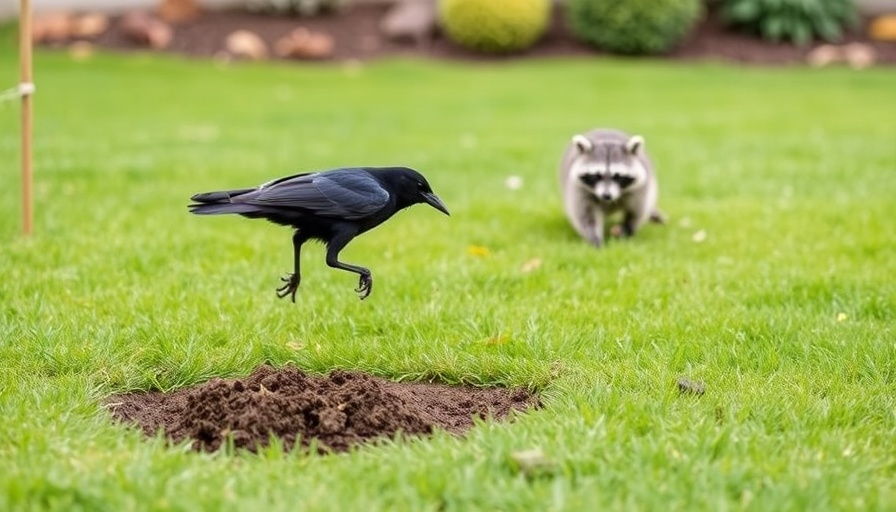
Understanding the Culprits: Why Crows and Raccoons Invade Your Lawn
Homeowners in the London area often take pride in their lawns, viewing them as an extension of their homes. Waking up to a devastated lawn is not just heart-wrenching; it signals an underlying issue. The primary culprits—crows and raccoons—are usually after a hidden treasure of lawn grubs, like chafer and Japanese beetles. These beetles lay larvae that thrive underground, and their presence can translate into visible chaos above. ECO-friendly pest management begins with understanding this vital connection between wildlife and lawn health.
Identifying Signs of Grub Infestation
Before even attempting to stop raccoons and crows from raiding, it is crucial to check for signs of grub infestation. A simple tug test can help you assess lawn health. If the grass comes up easily and has brown patches, grubs are likely present below. Their larvae tend to flourish during warm months, increasing the frequency of crows and raccoons appearing as they search for their primary food source. With that, identifying the state of your lawn becomes not only about aesthetics but also about ecology.
Eco-Friendly Solutions: Natural and Chemical Treatments
Combating grubs—and consequently, the pests drawn to your lawn—can be approached through a combination of natural and chemical treatments.
- Natural Predators: Encouraging natural wildlife can be a method to manage pest population. Birds, ground beetles, and nematodes can contribute to a balanced ecology that keeps pest numbers in check.
- Botanical Solutions: Certain essential oils, like neem or garlic, can deter raccoons and crows without harming them. Spraying these natural deterrents around the lawn can create an unwelcoming environment for these animals.
- Biological Pest Control: Utilizing beneficial nematodes, which target grubs while remaining harmless to birds and mammals, can prove effective, leading to an eco-friendly solution to your problem.
- Chemical Treatments: Chemical applications can be used cautiously with a focus on eco-friendly options that minimize damage to other wildlife. Interested homeowners should look for products that specifically target grubs without endangering non-target species.
Deterring Methods: Keeping Pests at Bay
Once the cause is addressed with appropriate treatments, the focus shifts to prevention. Implementing effective deterrents is essential to sustain a healthy lawn environment over time.
- Physical Barriers: Installing fencing or using bird nets can exclude larger pest animals. Consider fencing off specific areas where food sources might be present or areas that are particularly susceptible to damage.
- Repellents: Deploying natural repellents can minimize wildlife enticement. Sprinkling cayenne pepper or using commercial raccoon repellents near areas they've invaded can help significantly.
- Motion-Activated Devices: Investing in motion-activated sprinklers can startle intruders and discourage repeated visits. Light and sound deterrents are also practical options.
Restoring Your Lawn: Post-Infestation Repairs
Once crows and raccoons have been deterred, the next step involves repairing the damage done to your lawn. Quick restoration is crucial for preventing further complications. The following steps can facilitate effective lawn recovery:
- Reseeding: Applying a suitable seed mix for your area's climate can allow for natural regrowth, especially for bare patches left by digging.
- Top Dressing: Adding a light layer of compost can rejuvenate the soil, providing necessary nutrients that may have been depleted by pest activity.
- Consistent Care: Regular watering and mowing encourage healthy growth while promoting deep root growth, helping resist future infestations.
Conclusions and Actions
In summary, preventing crows and raccoons from plundering your lawn starts with understanding the ecosystem balance around your property. By identifying underlying grub issues and engaging in both immediate actions and long-term strategies, you can cultivate a vibrant, resilient lawn. Seek out local experts in eco-friendly pest control practices to find tailored strategies that suit your specific landscaping needs, and participate in community discussions about sustainable practices for pest management.
Take action today! Consider signing up for a workshop on eco-friendly lawn care, or contact a local expert to further inform your decisions for a healthier lawn.
 Add Row
Add Row  Add
Add 




Write A Comment